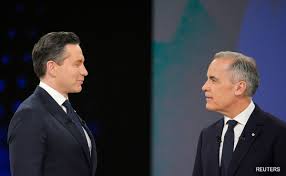OTTAWA: Canadian Prime Minister Mark Carney and Conservative leader Pierre Poilievre wrapped up their campaigns on a somber note on Sunday after at least 11 people died when a man drove through a crowd at a Filipino community festival in Vancouver.
Sunday was the final day of a five-week campaign for Carney and Poilievre to make their pitches to voters ahead of an election on Monday that has centered largely on U.S. President Donald Trump’s tariffs and threats to annex Canada.
It was unknown if the mass casualty event in Vancouver would have any impact on the election and both candidates offered their condolences. Police said they had arrested a 30-year-old Vancouver man who was “known” to them.
Carney planned to travel to Vancouver later on Sunday to join British Columbia Premier David Eby and community leaders, a Liberal Party official said.
“Our hearts go to the friends and the families of those affected. It’s a terrible loss in a very tight-knit community, the Filipino community in the Lower Mainland, the Filipino community here in Saskatoon, the 1-million-strong Filipino community across Canada, and in fact, all Canadians,” Carney said at a meeting with supporters.
Poilievre, speaking at an event in Oakville, Ontario, mentioned the tragedy and the country’s Filipino community “who have lost so much.” Supporters later chanted, “we want change,” emphasizing their demand for new blood after nearly a decade of Liberal rule under former Prime Minister Justin Trudeau.
Poilievre has promised to reduce spending on foreign aid, and axe a federal sales tax on Canadian-made autos as long as the U.S. tariffs are in place.
“We will reward production here in Canada,” he said.
Carney met with supporters in Saskatchewan after making a case a day earlier in Ontario that he is best placed to steer Canada through a crisis triggered by Trump’s tariffs. Later he will meet with supporters in Edmonton.
But an official with his campaign said the prime minister had canceled election day rallies in Calgary and Richmond, British Columbia, because of the car-ramming attack in Vancouver.
Carney, a two-time central banker and former college hockey goalie who took over this year after Trudeau resigned, had referenced the country’s most popular sport as he campaigned ahead of Monday’s election.
“We are in the equivalent of Game 7 of the Stanley Cup in the last two minutes,” Carney, 60, said in a speech north of Toronto, referring to the National Hockey League championship.
Pollsters say Carney’s Liberal Party holds a narrow lead in popular support ahead of final voting, after Trump slapped tariffs on Canada and repeatedly referred to the once-close ally as the 51st U.S. state. Trump’s comments enraged Canadians and reversed a lead of some 20 points for Poilievre, whom the Liberals have compared to Trump.
British Columbia’s 43 electoral districts are among the country’s most closely contested battlegrounds.
A Nanos poll on Sunday said the gap between the two front-running parties was approximately 4 percentage points, slightly wider than it had been on Saturday.
The poll put national Liberal support at 43% versus 38.9% for the Conservatives.
That result in national voting would usually translate into a Liberal win, because the party’s support is more concentrated than the Conservatives’ in urban areas rich with electoral districts, or seats. It is unclear if it would result in the Liberals winning a majority of seats to govern without a smaller party’s help.
Nanos surveyed 1,600 adult Canadians between April 24 and 26. The poll is accurate to 2.4 percentage points. An Ipsos Canada poll released later on Sunday also showed the Liberals leading by four points.
Poilievre’s promises of change and his pledges to curb living costs have resonated with young men, among others, leading to large crowds at rallies.
Carney, who has distanced himself from Trudeau’s policies since taking over in March and has attracted mainly older voters to rallies, had been expected to hold a frenetic four-province canvassing sprint on Sunday.


